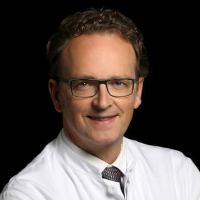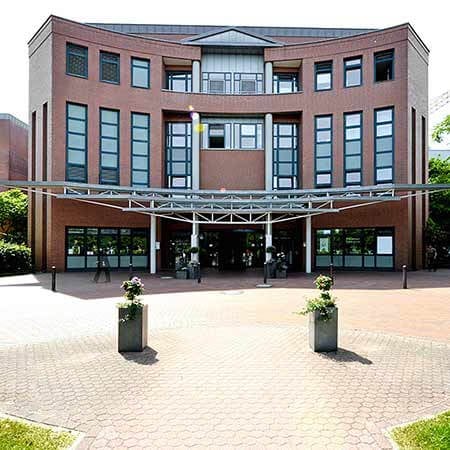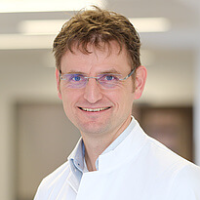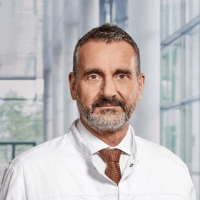Angina Pectoris (heart Attack) — Coronary Bypass Surgery (cabg): treatment in the Best Hospitals in the World
Treatment prices are regulated by national law of the corresponding countries, but can also include additional hospital coefficients. In order to receive the individual cost calculation, please send us the request and medical records.

Department of Cardiothoracic Surgery
According to the Focus magazine, the Department of Cardiothoracic Surgery ranks among the top German medical facilities specializing in the surgical treatment of diseases of the cardiovascular system and lung cancer! The department offers the full range of surgical services for the treatment of diseases of the cardiovascular system, respiratory tract, including heart and lung transplantation, artificial heart implantation. The therapeutic options include aortic surgery, coronary artery bypass grafting, transplantation surgery, surgical treatment of heart rhythm disorders (arrhythmias), minimally invasive surgery, surgical treatment of the heart valves, including reconstructive interventions. All operations are performed using state-of-the-art technology and in accordance with the current recommendations of professional societies.






Department of Cardiac Surgery
The Department of Cardiac Surgery provides a full range of surgical treatment in its area of specialization. Special emphasis is placed on heart valve repair and replacement surgery, coronary artery bypass grafting, thoracic aortic surgery, adult congenital and acquired heart disease surgery, pacemaker and defibrillator implantation, and artificial heart implantation for severe heart failure. Many heart operations are performed using minimally invasive techniques, which has a positive effect on the healing of the surgical wound. Minimally invasive cardiac procedures also reduce surgical risks and contribute to a rapid recovery of the patient in the postoperative period. Surgical treatment of cardiac pathologies is performed in advanced operating rooms equipped with the latest technology. The cardiac surgeons of the department successfully perform routine and complex surgical procedures, saving the lives of thousands of patients. The specialists work in accordance with current clinical protocols and follow the recommendations of the German Society for Thoracic and Cardiovascular Surgery (DGTHG).


Department of Cardiothoracic Surgery and Vascular Surgery
The Department of Cardiothoracic Surgery and Vascular Surgery provides effective surgical treatment for diseases of the heart, respiratory system, and blood vessels. The team of cardiac surgeons operates on patients with heart valve pathologies, coronary heart disease, heart failure, and heart rhythm disturbances. In the field of thoracic surgery, the key focus is on the surgical removal of lung tumors and lung metastases. The specialists in this area also perform surgery to repair chest wall deformities. In the field of vascular surgery, interventions for abdominal and thoracic aortic aneurysms are most often performed here. The department's vascular surgeons are also exceptionally competent in the treatment of peripheral occlusive arterial disease. A great advantage for the department's patients is that almost all surgical interventions are performed using minimally invasive techniques, so there is no need for a long postoperative recovery. The department's operating rooms are equipped with state-of-the-art technology. This allows for effective and safe treatment. The priority is always personalized medical care for patients.






Angina pectoris is not an independent pathology, but a syndrome by the means of which the coronary heart disease manifests. Angina pectoris (heart attack) is a kind of signal that the oxygen supply is not enough, and it shows by the episodes of sudden sharp squeezing and pressing discomfort. It is often accompanied by general discomfort, dyspnea, and heart palpitations.
Content
- What causes angina pectoris and how it is treated
- Symptoms and diagnosis of angina pectoris
- Coronary bypass surgery overview
- Contraindications for coronary artery bypass surgery
- Is there an alternative to CABG?
- Rehabilitation after CABG
- Where to undergo coronary bypass surgery?
- How much does treatment with CABG cost?
- How to undergo treatment abroad?
What causes angina pectoris and how it is treated
The major process that facilitates the development of angina pectoris (heart attack) is plaque formation in the coronary arteries. Cholesterol along with other substances accumulates on the walls of the vessels, causing the buildup. The plaques narrow the lumen of the vessels, reducing the amount of blood carried away from the heart.
Since at rest the need for oxygen is minimal, blood flow through affected vessels is enough. When a person is physically or emotionally stressed, the heart needs much more oxygen, but the narrowing in arteries creates an oxygen starvation. If pain sensation suddenly appears at rest, it usually indicates a sharp blood flow in the coronary arteries, or thrombosis. This condition is called unstable angina pectoris.
Symptoms and diagnosis of angina pectoris
Angina pectoris can often be identified at the first visit of the patient, whereas to reject the diagnosis, observation of the course and analysis of data from repeated inquiries and examinations are necessary. The following signs complement the clinical picture of angina, but their absence does not exclude the diagnosis:
- Localization of pain is behind the sternum (may recur in the neck area, in the lower jaw, and teeth, in the arm, usually the left, in the shoulder and scapula).
- Pain implies pressing, squeezing, less often burning body sensation in the chest (sometimes the patient may not experience pain, but a heavy sensation behind the chest).
- Increase in blood pressure simultaneous with the period of heart attack, pallor, sweating, and pulse rate fluctuations.
The thoroughness of questioning determines the timeliness and correctness of establishing the diagnosis. It often happens that the patient experiencing typical sensations for angina does not inform the doctor about them as "not related", or, on the contrary, pays attention to diagnostically minor sensations, which complicates the diagnosis.
Coronary bypass surgery overview
Currently, CABG is an efficient, yet complex and expensive treatment technique. The patients who underwent CABG, in comparison to drug therapy, showed better clinical results during perioperative period and 3-year follow-up.
During coronary artery bypass grafting, the patient's own veins and arteries are used as "new" vessels. Those are usually located in the extremities and front chest wall. They are replaced and fixed to the heart arteries below the places of blockage.
There are several ways to perform coronary artery bypass grafting (CABG). Heart bypass surgery can be conventional, off-pump and minimally invasive. The decision about the type of coronary artery bypass surgery is made after coronarography and expert evaluation of the degree of the damage to the vessels.
In the case of conventional coronary bypass surgery, a surgeon assesses the heart through the chest incision that goes along the midline of the sternum. The other incisions are often made on the legs, where surgeons usually take a vein for surgery from.
The fact is that vessels in the legs are relatively not affected by various heart conditions. In addition, they are larger and longer than other veins available for use in coronary bypass surgery. Finally, after taking a section of the vein from the leg, there are usually no problems later on.
People who have had a coronary artery bypass surgery by no means should stop taking prescribed medications. Most medications that are prescribed today after coronary artery bypass surgery are vital. In order to reduce the risk of clotting, it is often necessary to take medications that reduce its probability.
Contraindications for coronary artery bypass surgery
Contraindications to this intervention traditionally are diffuse spreading of pathology, detected aortic aneurysm, and clinical signs of congestive heart failure.
There are also contraindications regarding a general health condition in the form of severe comorbidities, in particular, chronic nonspecific lung diseases, renal failure, and cancer, all of which are relative. Advanced age is also not an absolute contraindication for coronary artery bypass surgery; surgeons refer more to risk factors of potentially conducted CABG in this case.
Is there an alternative to CABG?
Coronary angioplasty and stenting, which are alternative methods of angina treatment, are interventions aimed at dilating clogged blood vessels. The term "angioplasty" itself implies the procedure, during which a balloon to open vessels is applied. However, in modern angina treatment tactics in Europe, stenting can also be used along with angioplasty. The stent stays in the vessel and enables unimpaired blood flow.
The essence of angioplasty is that a catheter with a balloon connected to it, specially selected for its length and diameter, is inserted into the area of clogging. The balloon inflates once the catheter reaches the narrowed (damaged or unhealthy) area of the artery. The inflating balloon constricts the artery and frees the artery from the blockage, thereby enabling normal blood flow. By inflating it under pressure, constriction is possible to be eliminated in 96% of cases. After that, most patients forget about angina for many years. Then a stent is implanted into the area that was just treated and unobstructed after. This procedure is called stenting of the heart vessels.
A special type of X-ray helps the surgeon more accurately assess the extent of damage to the vessel, exactly where the blockage in the coronary artery is located and show how the contrast agent passes through the arteries.
Stenting can be either planned or performed as an emergency.
As the name implies, "emergency" stenting is performed in critical conditions when a coronary artery narrowing or occlusion must be repaired as quickly as possible to either keep your heart from infarction or limit the area of the infarction if it develops. And the earlier and more fully the blood flow through the arteries of the heart is restored in such a patient, the better the chances of an uncomplicated and favorable course of cardiac rehabilitation.
Scheduled stenting has the advantage of a longer time frame to adequately assess the nature of coronary artery lesions, choose the best treatment tactics for the patient, and carefully prepare the patient for the stenting procedure, minimizing the risks of the intervention.
Balloon angioplasty is currently not used in isolation. The procedure can be used both before stenting to prepare the lesion for stent implantation, and after it, for a tighter fit of the stent to the vessel wall in case of anatomical features of the artery in the place of stenting.
Rehabilitation after angioplasty and coronary stenting is similar in its basic principles to the rehabilitation after other surgical and non-surgical methods of angina pectoris treatment.
Rehabilitation after CABG
Immediately after the surgeon has performed coronary bypass surgery, the patient stays in the cardiac intensive care unit for several days and then is transferred to the cardiac surgical unit. The treatment in the postoperative period takes from one to two weeks, gradually passing to the recovery stage. Rehabilitation usually continues in a specialized medical facility, where a favorable regimen of physical activities is created to gradually train the heart. Rehabilitation involves the use of physical therapy and therapeutic exercises to restore general state of health. Recovery after surgery usually takes a month, rarely more.
The common outcome of coronary artery bypass grafting (CABG), and for those for whom it is contraindicated, of angioplasty, is the absence of angina, the ability to handle gradually increasing volume of modified physical activity, and the ability to work again. Coronary bypass surgery reduces the chances of potential heart attack and decreases the number and dosages of medications to a minimum, as proven by numerous scientific studies.
For all of the mentioned alleviating factors to reach their maximum potential, a major aspect influencing the successful aftereffect from coronary artery bypass surgery should be taken into consideration, which is a compliance with all of the doctor’s recommendations in the postoperative period, which may regard taking medications, usually selected prior to surgery (a combination of drugs necessary to prevent thrombosis and stabilization of atherosclerotic plaques).
Where to undergo coronary bypass surgery?
Coronary artery bypass surgery is the most prevalent technique held for the treatment of heart attack. Hundreds of thousands of people successfully undergo this operation every year. Timely coronary bypass surgery prevents the chances of recurrent heart attack and the probability of other coronary artery diseases.
There is a reason why so many people undergo this surgery abroad. The procedure lasts several hours minimum and does require sufficient experience from a surgeon. CABG performed with the use of spearing surgical techniques, ultra-precise robotics and special video imaging requires special training from the surgeon as well. Taking into consideration that coronary bypass surgery is the widespread heart surgery conducted abroad, the level of expertise of the specialists in hospitals abroad does not cause any doubt.
The best hospitals for coronary artery bypass grafting are considered to be:
- University Hospital Oldenburg, Germany.
- University Hospital of Ludwig Maximilian University of Munich, Germany.
- Assuta Hospital Tel Aviv, Israel.
- HELIOS Heart Surgery Clinic Karlsruhe, Germany.
An overview regarding the conditions of stay in the mentioned hospitals is available on the Booking Health website.
How much does treatment with CABG cost?
Many people experiencing the health condition require planned or emergency coronary artery bypass surgery, and they usually wonder what is the price for it.
Coronary bypass surgery fits in the category of expensive high-tech methods of medical care, accordingly, the cost of treatment with coronary artery bypass surgery in the reputable cardiac hospitals cannot be referred to as low, although it may vary depending on the complexity of the operation for a particular patient and the services that the patient is provided after the heart surgery.
The typical prices for heart surgery are presented below:
- The cost of treatment with CABG in German hospitals starts at 20,600 EUR.
- The cost of treatment with CABG in Turkey starts at 14, 988 EUR.
- The cost of treatment with CABG in Israel starts at 32,835 EUR.
How to undergo treatment abroad?
You could organize treatment with coronary artery bypass procedure yourself, but it is far more convenient to entrust experts with it. The preparation of the necessary documents, visa application, setting up the flight tickets, and transfer will be arranged for you by Booking Health.
Booking Health specialists will also find the most suitable hospital and the best doctors in the field for the treatment of heart attack for you. Booking Health does everything necessary to provide the trip and treatment of heart attack of the highest level at a loyal price, and for the stay at the hospital to be the most comfortable for you.
The amazing thing is that if you are only interested in coronary artery bypass graft (CABG) abroad at this point, Booking Health will provide you with reliable information for free, as the primary focus of the company is transparency.
Fill in the request form on the Booking Health website to get a consultation or to start your treatment.
Authors:
This article was edited by medical experts, board-certified doctors Dr. Nadezhda Ivanisova, and Dr. Bohdan Mykhalniuk. For the treatment of the conditions referred to in the article, you must consult a doctor; the information in the article is not intended for self-medication!
Our editorial policy, which details our commitment to accuracy and transparency, is available here. Click this link to review our policies.

